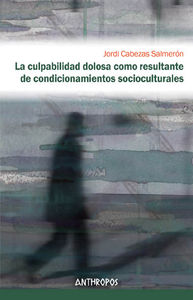
Jordi Heads raises and attempts to answer the following questions:
What should be kept, that there is guilt normal when there is abnormal ability of motivation for the standard?
Can affect the constraints socio-cultural to the ability of motivation?
What affect with enough intensity?
If this is so, why not consider them, in the field of guilt, as is done with other factors demotivating, as the error, or other?
What is the current society generates profound inequalities and environment socio-cultural other, in spite of the high level of individual freedom reached?
If this were so how to the service of who is the criminal Law, which clings to the figure of the average man and not to the real man, in the stage of guilt, when there are distant subjects that normal media, precisely because of those who are closest to her?
Would it be true that consideration of the social and cultural problems, a rapprochement between the Criminal Law and Criminology?
Why, even to understand convenient to the consideration of those factors, it maintains that this is not possible in the prosecution phase, if it is then bound in the execution phase of prison?
Support the consideration of these constraints, this work advocates – the guilty intent, will be also conditioned by such socio-cultural factors, which may decrease the appreciation of desvalor and the consequent motivation to refrain from action out of respect to the norm primary that prohibits such behavior, with the resulting loss of guilt.
(pp. 7-8)
These issues are explaining the title of his book, The guilty intent as a result of social and cultural problems. “These conditions have affected and should therefore be cherished. Also reckless conduct, although not treated here, it is also affected by these constraints than molders of personality make that certain subjects are more cautious and meticulous than others, which connects with the lack of precautions taken, configurator of recklessness”.
The constraints socio-cultural and economic can seriously affect the motivation of the subject by the rule, and, consequently, it is not valid, the figure of the “middle man” as a “barometer” to measure the capacity of motivation of all individuals —regardless of their circle of belonging— in the current society, generating inequalities. In any prosecution, the “middle man” should yield the field to the “real man”. Therefore, if other figures such as the inimputabilidad or error are supported by the criminal doctrine as causes that may prevent the motivation of the subject by the standard, and therefore impact on the determination of his guilt, should also be considered -for really significant way – the conditions referred to above because, even though etiology is different, produce similar effects demotivating. Such equalization is, in addition, a consequence of the principle of equality before the law, understood as unequal treatment of the unequal.
.
.
Index
.
Utopias of Control and Control of Utopia
Editorial project in collaboration between the Observatory of Penal System and Human Rights (OSPDH) of the University of Barcelona and Anthropos Publishing house
Coordinated by Roberto Bergalli and Iñaki Rivera Beiras.
The call concerned a criminal, in the fields of knowledge relating to the study and understanding of the societies, has been using in the last decades, in Europe, principles, categories and research methods of the social sciences. In some fields more restricted in human behavior, such changes were appropriate to explain, supplement or correct what until then had been the unique parameters of understanding of the criminal conduct: the medical and the legal. In such a mode, and with alterations also occurred in the field of the social theories, in which was felt with much force, the impact of the critical thinking of the so-called School of Frankfurt, the knowledge of criminological became, also, slowly but gradually, in a fertile ground of questioning the traditional know-how. The individual causes of the criminal conduct, the guidance of such knowledge and complementary of the definition legal-criminal of such conduct, they began to lose interest and central to be replaced by the study of the processes by which societies construct and apply the definitions of the behaviors reprehensible, both socially and legally. In this way it was like the knowledge of criminological expanded and, at the same time, became more social and political.
The true epistemological revolution occurred when it is definitely, the object of study of the tradicinoalmente called criminology moved the crime to the control of the same.
A new way of addressing the issue of criminal had been opened and, through it, for the first time in a coordinated manner, they were to be analyzed, for example, the processes of creation of the criminal law (Penal System is static), or the creation and update of the law enforcement agencies, judicial and prison System (Criminal dynamic). In effect, the object of study had shifted: it was now studying, researching and observing the System itself Criminal. This new epistemology is, on which rests this project Utopias of Control and Control of the Utopias.
.
Brief review about the author

Jordi Heads Salmeron is a lawyer, he holds a Higher Diploma in Criminology and Doctor in Criminal Law and Criminal Sciences from the University of Barcelona. Member of the Observatory of Penal System and Human Rights of the University. It is also a former professor at the Institute of Criminology and Private Investigation and professor at the “Official Master in Criminology and Sociology Criminal justice”, University of Barcelona, as well as of criminal Law and Criminal Procedure at the School of Police of Catalonia. Is also professor criminal in the School of Legal Practice of the ICAB. Author of different research papers and articles; among the most recent: “Criticism of the new Law of the child and “re-evaluation criticism of the concept of criminal responsibility of minors”.
